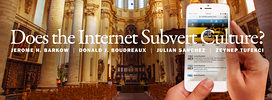Julian Sanchez and Zeynep Tufekci each, in his and her own eloquent way, make points that I, with much less eloquence, strove to make in my first essay.
Julian’s and Zeynep’s essays bring to mind my colleague Tyler Cowen’s 1998 book, In Praise of Commercial Culture and his 2002 follow-up volume, Creative Destruction: How Globalization is Changing World Cultures. If he hasn’t yet done so, I urge Prof. Barkow to read these two books. In each, Tyler reviews the many different fears expressed throughout history of how commerce – both in and of itself, and of the extension of commerce across political or ethnic borders – will weaken, worsen, or wreck ‘good’ cultures. With an enviable mastery of not only economics and of history, but also of art and culture, Tyler demonstrates that these fears were almost always unjustified.
Nearly all of the cultures that we know today are themselves the products of past mixings of cultures – mixings that creatively destroyed older cultures and replaced them with newer, more vibrant ones. This cultural evolution has, no doubt, always been accompanied by older people fretting about the future. But as Tyler explains, such fretting reflects the reality that human beings’ cultural skills are specialized to deal with the culture of their youth. I remember being mystified as a young man that my grandparents not only did not enjoy the Beatles’ music, but seemed genuinely to find it to be “nothing but banging and screaming” (to quote a description that I remember well from my paternal grandfather who, circa 1974, came upon me as I was listening to the Fab Four’s “She’s a Woman.”)
But there’s no mystery: we each become specialized in the culture of our youth, and so we have at least as much difficulty learning to understand and to “use” new cultural developments as, say, an auto mechanic from 1964 would encounter were he to try his hand at repairing the engine of a 2014 Toyota Rav4. It’s doable, but it’s neither easy nor comfortable. And the need to do it isn’t especially welcome.
I see no reason to suppose that the cultural mixings promoted by the Internet are likely to be worse than were the mixings in the past that were promoted by earlier means of mass communication and by globe-spanning trade. Put differently, while the media and mechanisms that drive cultural mixing – and, hence, that drive cultural evolution – today differ from those of the past, there’s no evident reason to fear that these differences will be any less enriching and empowering than were the cultural changes of yesteryear.

